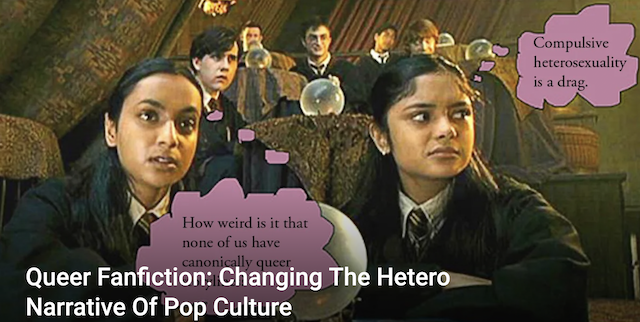
This article was originally published here.
I read my first piece of fanfiction at the age of fifteen. It was a thirty-chapter fic based in the Rizzoli and Isles universe. Rizzoli and Isles was a TV show that followed the friendship between a cop (Rizzoli) and a medical examiner (Isles). A large part of the show’s audience caught the lesbian subtext underlining their relationship and thus was born the ship – ‘Rizzles’.
This is not the only example of a friendship being viewed as having queer undertones. Other examples include ‘Johnlock’ (Sherlock Holmes and John Watson, from the TV show Sherlock), ‘Bechloe’ (Beca Mitchell and Chloe Beale, from the Pitch Perfect series) and ‘Wolfstar’ (Sirius Black and Remus Lupin, from Harry Potter). The common trend among all these ships is that none of them came to fruition, which is where fanfiction steps in.

Make no mistake, fanfiction is also written about heterosexual couples. However, it is particularly popular amongst queer fandoms. An informal census conducted by a fanfiction website in 2013, Archive of Our Own (AO3), found that only 38% of its respondents identified as heterosexual.
Fanfiction is often considered a space in which both reader and writer can safely explore their sexuality and gender identity. Psychologist Jennifer Barnes also claims that fanfiction influences its readers and writers to be better people because they develop strong relationships with fanfic characters, increasing the motivation to achieve an “ideal self”.
Fanfiction communities are also strong support systems – by commenting on stories and encouraging writers, one can find people with similar interests from around the world. It is also easier to connect with people who have a deep understanding of your struggles as a queer individual because they have found themselves in similar circumstances.
Fanfiction is often considered empowering because it does not impose any restrictions on its writers. Writers are free to change anything about the original story. In the case of fanfiction written about the ships mentioned in the first paragraph, the characters often end up in an established relationship or the story begins with them in an established relationship and follows their future.

Fanfiction does not have to be set in the original universe of the characters. For example, a relationship between Beca and Chloe need not blossom within the context of inter-collegiate acapella, but rather in New York City with Beca as a rockstar and Chloe as a well-known actor.
The desire to rewrite original events is particularly evident in the fanfiction written post the death of Lexa on The 100. Lexa was a lesbian warlord. She was killed by a stray bullet, shortly after consummating her relationship with longtime love-interest, Clarke Griffin.
Her death caused a furore among many in the queer community and served as a catalyst for bringing attention to the Bury Your Gays trope – relating to a tendency in film and television to kill off its queer characters. Most ‘Clexa’ (Clarke and Lexa) fanfiction written currently aims to right the wrong of Lexa’s death and grant ‘Clexa’ their happy ending.
Queer fanfiction has great social and political implications because it encourages the author to engage with the disappointments of marginalised communities. The characters in most fics are not defined solely by their queerness, rather they have full personalities and lead full lives. Thus, the label of queer does not represent the end to their story, but a starting point.
The current ‘Clexa’ fanfiction I’m reading takes place in the Harry Potter universe and their love story is a small but important part of a larger prophecy they must fulfil as individuals in the middle a wizarding war. Another possibility opened up by fanfiction is that your favourite characters from different books, TV shows and films can meet in one story.

Despite the many positives of fanfiction, people who belong to the community as both readers and writers hesitate to talk about it with other people. Fanfiction has often been criticised as being something that takes other people’s original ideas and turns them into frivolous stories.
Those who read fanfiction are considered to be immature and often consumers of pornography. A lot of fanfiction has detailed sex scenes. One of the tags usually associated with such fics is that of smut. Those who write fanfiction are accused of being overly involved fans without lives of their own.
Queer fanfiction has social and political implications as it encourages engagement with the disappointments of marginalised communities.
Members of the fanfiction community have responded to these harsh criticisms by claiming that while Slash (fanfiction written about same-sex relationships) is a very popular genre of fanfiction, not all Slash fics contain sex. Slash can also be a comment on the popular ways in which desire is coded.
Fanfiction is a way for the queer community to refuse to be relegated to the margins of popular culture. These fics are powerful because readers and writers can engage with media texts, interpret them and reconstruct them – thereby producing content that has been desired and demanded for a long time. To quote Slate, “In writing fanfiction, we do more than rewrite our favourite stories. We take these stories and make them strong enough to handle people like us”.
Where the fanfiction community is severely lacking is in writers of colour. It is extremely difficult to find fanfic set in the Indian context. A cursory search on google will pop up results on Bollywood fanfiction – including a multi-chapter fic on Student of the Year with 130 reviews.
Indian queer fanfiction is non-existent – results pertaining to this category are Harry Potter fics featuring one or both of the Patil sisters as queer. Why does this lack exist? Could it be attributed to the society’s and the law’s intolerance toward LGBTQ identities? Or are there other possible reasons?
References: